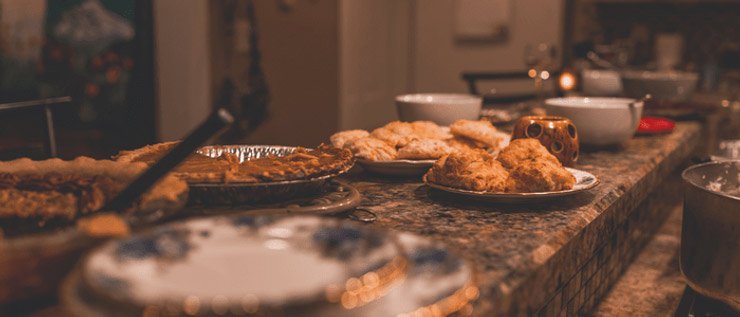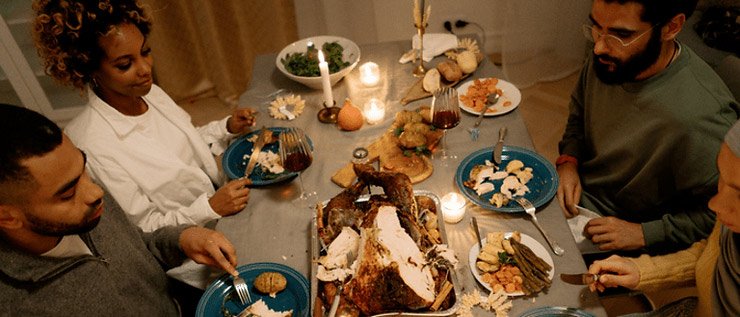Eating Disorders Around the Holidays - Strategies to Cope
Thanksgiving to New Year's day is a joyous time for everyone to connect and celebrate with friends and family during holiday occasions. However, it can also be a very stressful time for many. Food is a very prevalent part of the holiday season, making it clear that those suffering from eating disorders can, understandably, have a difficult time during Thanksgiving and Christmas. With over 30 million people in the United States alone suffering from eating disorders, it's important to acknowledge this problem and do the best we can to address it.
Some of the most common eating disorders people experience include anorexia, bulimia, binge eating disorder (BED), and eating disorder not otherwise specified (EDNOS). With so many people around the world struggling with eating disorders, it is not uncommon to know someone suffering from one, which makes it all the more crucial to educate ourselves on how people are affected by them. If you would like to know more about the most common signs and symptoms of eating disorders, the National Eating Disorder Association (NEDA) provides a comprehensive list of them on their website, here.
Food is not the Only Culprit
The most discernible reason for people with eating disorders to struggle during the holidays is food, but it's not the only reason. Randy Hartman, a doctor at the regional Center for Change treatment center in Utah interviewed some of his patients who at the time were in treatment for their eating disorders about how the holidays affected them. "This is the time of year that sort of amplifies the anxieties for these women. The emotional intensity and the food is a double whammy for them," he said. "Most family members think it is about food and weight, but it is about self-rejection" (Haddock). In fact, women are not the only one's that face this problem. According to NEDA, 25% of those with anorexia are men, who actually have a higher mortality risk than women because of the presumption that men do not have eating disorders.
The other major culprit of emotional distress for those with eating disorders during the holidays is family conflict. It is not unusual for people suffering from eating disorders, as well as those who don't, to have unresolved issues with their family that are bound to influence them when gathered with those family members at holiday events. Hartman goes on to say, “To be immersed in the family context brings up all the issues, fears, conflicts and worries that feed the eating disorder that causes everyone so much pain” (Haddock). These emotions during the holidays caused by food and family can be a very unpleasant back-and-forth experience of stress for people, potentially fueling the urge to engage in damaging behaviors seen in eating disorders.
What can be done to help people with eating disorders cope during this time of year?
Although it's not possible to eliminate holiday stress entirely, there are things we can do to protect our physical and mental health during the holidays. Here are a few strategies you or your loved ones can try to help keep stress to a minimum this holiday season:
It is perfectly normal to get overwhelmed but do your best to show yourself some compassion. Getting through the holidays is difficult and those feelings are valid. Give yourself some credit!
Be consistent with your routine and create structure in your life. Make sure to get enough sleep, eat and snack regularly, and plan ahead to avoid committing to too much in your personal and professional life.
Take the time to think about what your expectations are going to be for the holidays. Not everything is going to be perfect, and that's okay.
Set some realistic goals ahead of time. They do not need to be major achievements- even just staying consistent is a great goal. Avoid all or nothing goals!
Plan ahead. Figure out what foods will be prepared for the events you attend and when they will be served to prepare yourself mentally. Ask someone to be your support person that you can go to if you get overwhelmed. Create a plan to leave an event if you become triggered and need to leave.
Avoid diet talk and labeling foods as “good” or “bad”. All food is good food especially during the holiday season! Consider thinking about all the different ways food holds meaning- from nutrients to traditional or religious value.
If you need help, ask! Go to someone you trust to talk, ask someone to be your support person during meals or plans that you know will be triggering, or see a therapist to aid you in your recovery during the holidays.
Set healthy boundaries. Put yourself and your needs first! You are not selfish for doing so.
Make self-care a priority. Self-care becomes especially important during this time of the year.
Focus on one day at a time. You’re going to do great ❤
This list serves as a reminder of what many people with eating disorders may go through during the holiday season and is for educational and informational purposes only. It is not a substitute for medical advice, diagnosis, or treatment.




